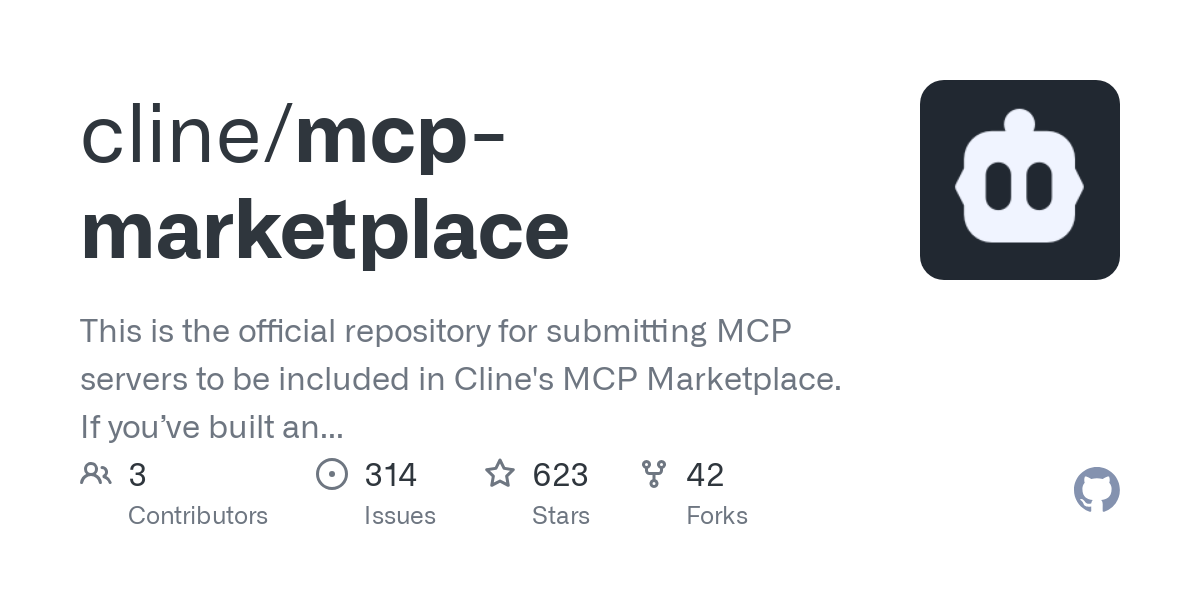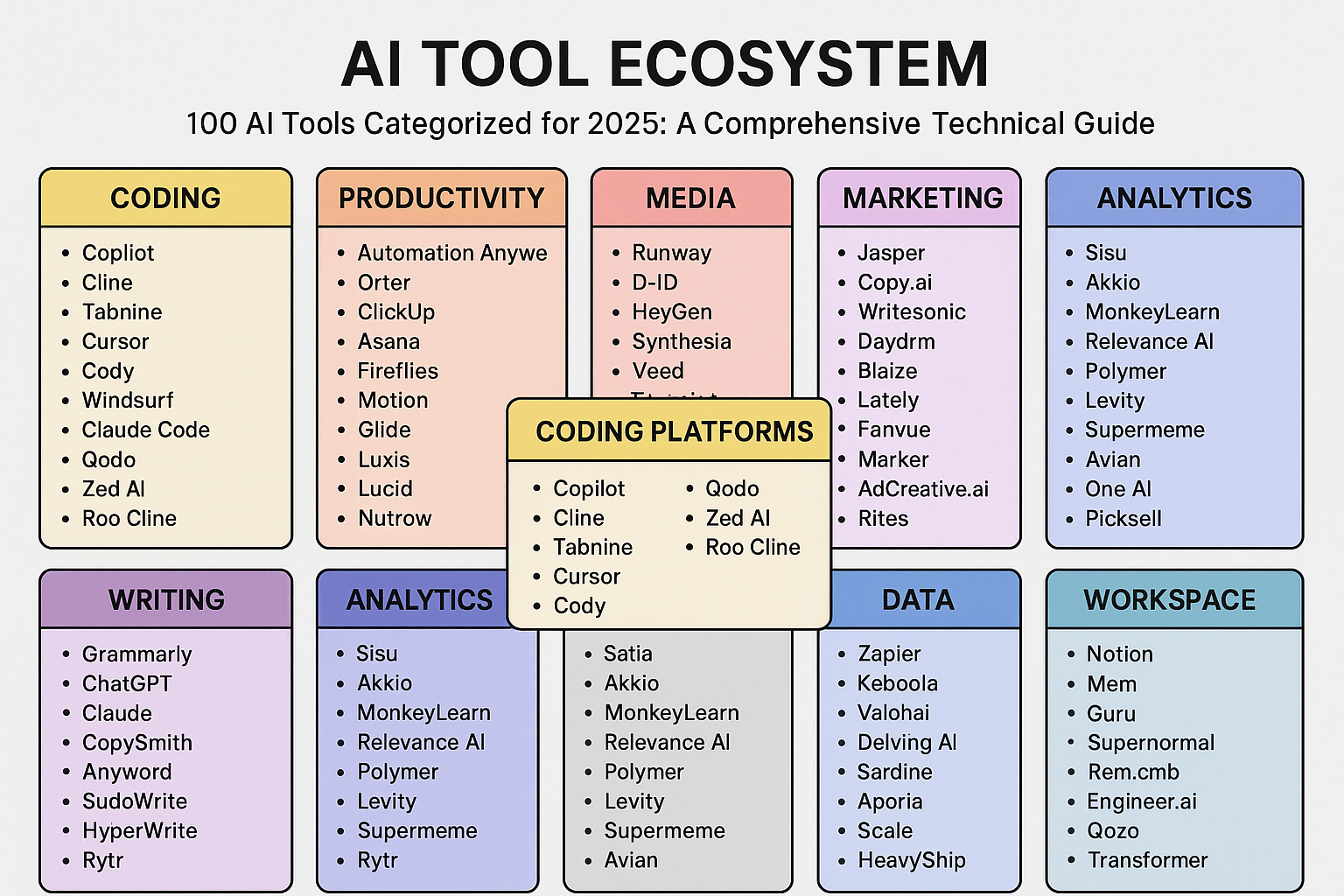Comparing Top AI Coding Assistants in 2025 for Productivity, Code Quality, and Workflow Integration: AI Tools for Engineers & Developers: A Comprehensive Technical Comparison
- Comparing Top AI Coding Assistants in 2025 for Productivity, Code Quality, and Workflow Integration: AI Tools for Engineers & Developers: A Comprehensive Technical Comparison
- 🚀 Complete Setup Guide for Claude Code (2025 Edition)
Context and Continuation
In our recent exploration, “100 AI Tools Categorized for 2025: A Comprehensive Technical Guide,” we analyzed a diverse array of AI-powered tools transforming productivity across domains like conversational AI, video generation, content creation, and software development. Published as part of Datanizant’s mission to illuminate the AI landscape, that guide highlighted tools such as ChatGPT, Midjourney, and GitHub Copilot, categorizing them by use case and quantifying their impact (e.g., 70–95% time savings). This blog builds on that foundation, offering a focused, in-depth comparison of AI coding assistants and related productivity tools tailored for engineering leaders, AI developers, and product builders. By narrowing the scope to tools like Cline, Cursor, and Sourcegraph Cody, we aim to provide actionable insights for optimizing software development workflows in 2025, continuing our commitment to delivering technical clarity and strategic guidance.
Introduction
In 2025, AI-powered coding assistants have evolved from simple autocompletion tools to sophisticated development partners that enhance productivity, streamline workflows, and improve code quality across the software development lifecycle. For engineering leaders, AI developers, and product builders, selecting the right tool requires a deep understanding of technical capabilities, integration potential, and alignment with team workflows. This blog offers a comprehensive comparison of leading AI coding tools, assessing their strengths, limitations, and suitability for various engineering applications. The tools analyzed include Cline, Cursor, GitHub Copilot, Sourcegraph Cody, Tabnine, Windsurf, and Claude Code, with additional consideration of emerging tools like Qodo, Zed AI, and Roo Cline. Tools like Void AI, Devstral, Clark, and Factory were excluded due to limited public information or their lack of relevance in the current landscape.

Evaluation Criteria
To ensure a fair and technical comparison, we assess each tool based on the following criteria:
- Code Completion & Generation: Accuracy, context-awareness, and ability to generate complex code structures.
- Codebase Understanding: Ability to index and reason about entire codebases for context-aware suggestions.
- Integration & Ecosystem: Compatibility with IDEs, APIs, and development workflows.
- Security & Privacy: Data handling, compliance, and support for on-premises or privacy-focused deployments.
- Pricing & Scalability: Cost-effectiveness for individual developers, small teams, and enterprises.
- Unique Features: Differentiators such as agentic capabilities, terminal integration, or UI design support.
Tool Comparisons
1. Cline
Overview: Cline is an open-source VS Code extension that integrates with multiple LLMs (e.g., Claude, GPT-4o, DeepSeek) via APIs like OpenRouter. It emphasizes a developer-centric approach, offering robust context management and extensibility through the Model Context Protocol (MCP).
Key Features:
- Code Completion & Generation: Provides accurate, context-aware suggestions with support for multi-file edits and AST parsing.
- Codebase Understanding: Indexes entire codebases, enabling precise suggestions based on project structure and documentation.
- Integration & Ecosystem: Supports OpenRouter, Anthropic, OpenAI, and local models. The MCP Marketplace (introduced in February 2025) allows custom integrations with CI/CD, cloud monitoring, and project management tools.
- Security & Privacy: The open-source nature ensures transparency, with no proprietary code retained. Supports local model deployment via LM Studio or Ollama.
- Pricing & Scalability: Free tier with essential features; premium features at $10/month. Scalable for teams via MCP extensibility.
- Unique Features: MCP enables interaction with development environments (e.g., terminal commands, file management), making Cline a “full-stack development ecosystem.”
Best for: Teams requiring customizable, cost-effective AI assistance with a strong codebase understanding and robust privacy requirements.
Limitations: Lacks native autocomplete in some configurations; occasional issues with repetitive file edits.

2. Cursor
Overview: Cursor is an AI-first IDE built on VS Code, designed for speed and deep integration with projects. It leverages models like Claude 3.5 Sonnet, GPT-4o, and its custom cursor-small model.
Key Features:
- Code Completion & Generation: Advanced multi-line completion with auto-imports and context-aware suggestions. Composer mode generates entire applications from natural language prompts.
- Codebase Understanding: Excels at project-wide operations, understanding complex dependencies, and refactoring legacy codebases.
- Integration & Ecosystem: Supports VS Code plugins, Figma integration, and terminal commands via Cursor Agent. Preconfigured MCP handlers simplify setup.
- Security & Privacy: Not explicitly open-source; data privacy details are less transparent compared to Cline.
- Pricing & Scalability: Free Hobby tier with limited features; Pro tier at $20/month, Business tier at $40/user/month. Suitable for large teams but costly for individuals.
- Unique Features: Composer mode for project-wide operations and Figma-to-code conversion for UI-heavy development.
Best for: Developers and teams working on complex, UI-heavy, or full-stack projects that require rapid implementation.
Limitations: Higher cost and steeper learning curve for beginners; limited offline support.

3. GitHub Copilot
Overview: Developed by GitHub and OpenAI, Copilot is a mature AI assistant integrated into IDEs like VS Code, Visual Studio, and JetBrains. It supports multiple models, including Claude 3.5 Sonnet and GPT-4o.
Key Features:
- Code Completion & Generation: Reliable real-time, multi-line completion with ethical guidance. Copilot Chat handles complex tasks but feels less integrated than Cursor’s features.
- Codebase Understanding: Uses a vector database to index codebases, though it’s less advanced than Cursor or Cody for project-wide context.
- Integration & Ecosystem: Seamless integration with GitHub workflows and IDEs. Copilot Agents extend functionality for documentation and data retrieval.
- Security & Privacy: Trained on public code, raising potential licensing concerns. Enterprise plans offer SOC 2 compliance.
- Pricing & Scalability: Free tier with 12,000 completions/month; Pro at $10/month, Business at $19/user/month. Free for students and open-source contributors.
- Unique Features: Copilot Workspace automates full development cycles, generating pull requests from GitHub issues.
Best For: Enterprise teams integrated with GitHub ecosystems and developers seeking cost-effective, reliable autocomplete.
Limitations: Limited agentic capabilities compared to Cline or Cursor; inconsistent code quality requiring manual review.


4. Sourcegraph Cody
Overview: Cody, developed by Sourcegraph, focuses on team productivity through deep codebase understanding and integration with Sourcegraph’s code search platform.
Key Features:
- Code Completion & Generation: Fast generation of snippets and full functions, with strong support for Flutter and other languages.
- Codebase Understanding: Exceptional at indexing large repositories, referencing documentation, and ensuring consistent team outputs.
- Integration & Ecosystem: Compatible with VS Code, JetBrains, and multiple LLMs (Claude, GPT-4o, Gemini). Limited language support compared to Copilot.
- Security & Privacy: The Enterprise plan emphasizes security for large codebases, although it is less transparent than Cline.
- Pricing & Scalability: Free for individuals; Pro at $9/month, Enterprise at $19/user/month. Accessible for teams of all sizes.
- Unique Features: Shared prompts and code smell detection enhance team collaboration and code quality.
Best For: Enterprises with large codebases needing consistent, team-oriented AI assistance.
Limitations: In some cases, slower suggestions may occur; issues with the JetBrains plugin have been reported.


5. Tabnine
Overview: Tabnine is an AI assistant focused on secure, context-aware code completion, with a hybrid LLM approach supporting local model deployment.
Key Features:
- Code Completion & Generation: Context-aware, multi-line completion for over 80 languages, with strong refactoring and linting support.
- Codebase Understanding: Indexes codebases for tailored suggestions, though less comprehensive than Cody or Cursor.
- Integration & Ecosystem: Integrates with VS Code, IntelliJ, and Sublime. Supports local models for offline use.
- Security & Privacy: Prioritizes security with zero data retention and SOC 2 compliance, ideal for sensitive projects.
- Pricing & Scalability: Free basic plan; Pro at $12/month. Cost-effective for secure enterprise environments.
- Unique Features: Local model support for offline use and automatic code documentation.
Best For: Security-conscious enterprises and developers needing offline capabilities.
Limitations: Lacks advanced agentic features; free version misses some premium capabilities.

6. Windsurf
Overview: Developed by Codeium, Windsurf is an AI-first IDE with a focus on lightweight, context-aware workflows powered by its Cascade engine.
Key Features:
- Code Completion & Generation: Smarter autocomplete with Cascade, supporting multi-step workflows.
- Codebase Understanding: Strong project awareness, though less mature than Cursor or Cody.
- Integration & Ecosystem: Integrates with VS Code, JetBrains, and APIs. Supports real-time collaboration and MCP.
- Security & Privacy: Open-source with zero data retention, balancing privacy and functionality.
- Pricing & Scalability: Free tier; Pro at $15/month. Affordable for teams and solo developers.
- Unique Features: AI Flow Paradigm for multi-step tasks and real-time collaboration tools.
Best For: Teams seeking affordable, collaborative AI tools with modern workflows.
Limitations: Limited plugin ecosystem; slower completion speed compared to Cursor.

7. Claude Code
Overview: Anthropic’s terminal-based AI tool, Claude Code, focuses on agentic workflows, allowing developers to delegate complex tasks via natural language.
Key Features:
- Code Completion & Generation: Strong at generating and editing code via terminal commands, with test suggestions.
- Codebase Understanding: Reads and searches codebases effectively, though terminal-based interaction limits real-time feedback.
- Integration & Ecosystem: Terminal-centric, with limited IDE integration. Supports Claude models natively.
- Security & Privacy: Built on Anthropic’s constitutional AI principles, ensuring ethical and secure operations.
- Pricing & Scalability: Pricing tied to Anthropic’s API token usage; no standalone subscription details available.
- Unique Features: Agentic capabilities for executing bash and Git commands, and committing to GitHub.
Best For: CLI enthusiasts and developers delegating repetitive tasks in terminal-heavy workflows.
Limitations: Lacks native IDE integration; requires familiarity with terminal workflows.
Emerging Tools
- Qodo: A rising tool with robust test case generation and accurate code suggestions, including docstrings and exception handling. Best for developers prioritizing testing workflows. Limited integration details available.
- Zed AI: Built in Rust for performance, Zed AI offers tab completion but lags behind in AI feature maturity. Promising for developers valuing speed but not yet competitive with main contenders.
- Roo Cline: A fork of Cline with enhanced chat modes and prompt customization. Popular for its low cost and Claude integration, but lacks autocomplete. Suitable for budget-conscious developers.
[Image Placeholder: Emerging Tools Comparison Chart]
Suggested Image: A bar chart comparing the feature maturity of Qodo, Zed AI, and Roo Cline against established tools.
Comparative Analysis
| Tool | Code Completion | Codebase Understanding | Integration | Security/Privacy | Pricing | Unique Strength |
|---|---|---|---|---|---|---|
| Cline | Strong, multi-file | Excellent, MCP-driven | VS Code, APIs | Open-source, local | Free/$10 | MCP Marketplace |
| Cursor | Advanced, multi-line | Project-wide, Composer | VS Code, Figma | Less transparent | $20/$40 | Composer, UI focus |
| GitHub Copilot | Reliable, multi-line | Good, vector-based | GitHub, IDEs | SOC 2, public code | $10/$19 | Workspace automation |
| Sourcegraph Cody | Fast, team-focused | Exceptional, repo-wide | VS Code, JetBrains | Enterprise-grade | $9/$19 | Team productivity |
| Tabnine | Context-aware | Good, codebase-aware | Multiple IDEs | Zero retention | $12 | Offline support |
| Windsurf | Smarter, Cascade | Strong, project-aware | VS Code, APIs | Open-source | $15 | AI Flow Paradigm |
| Claude Code | Terminal-based | Effective code search | Terminal-only | Constitutional AI | API-based | Agentic workflows |
[Image Placeholder: Comparative Feature Matrix]
Suggested Image: A heatmap or table visualizing the comparative analysis, highlighting strengths across criteria.
Recommendations
- Solo Developers: Cline or Tabnine offer cost-effective, privacy-focused solutions with strong code completion. Cline’s free tier and MCP extensibility make it ideal for budget-conscious individuals.
- Small Teams: Windsurf and Sourcegraph Cody balance affordability and collaboration. Windsurf’s real-time features suit dynamic teams, while Cody excels in managing large repositories.
- Enterprises: GitHub Copilot and Sourcegraph Cody are best for GitHub-integrated or large-scale environments. Tabnine is a strong choice for security-sensitive projects.
- UI/Full-Stack Developers: Cursor’s Composer and Figma integration make it the top choice for rapid, UI-heavy development.
- CLI Enthusiasts: Claude Code is ideal for terminal-based workflows, though it requires technical proficiency.
Conclusion
The AI coding assistant landscape in 2025 offers a diverse range of tools tailored to various engineering needs. Cline stands out for its open-source flexibility and MCP-driven ecosystem, making it a versatile choice for custom workflows. Cursor excels in speed and UI-focused projects, whereas GitHub Copilot remains a reliable and enterprise-friendly option. Sourcegraph Cody and Tabnine cater to team productivity and security, respectively, while Windsurf and Claude Code offer innovative workflows for specific use cases. Engineering leaders should evaluate tools based on team size, project complexity, and security requirements, leveraging platforms like Jellyfish to measure ROI through metrics like cycle time and code churn.
Ultimately, the right tool depends on your workflow, budget, and strategic goals. By aligning AI capabilities with your team’s needs, you can unlock significant productivity gains and elevate software development in 2025.
[Image Placeholder: ROI Metrics Dashboard]
Suggested Image: A mockup of a Jellyfish dashboard showing cycle time and code churn metrics for AI tool evaluation.


